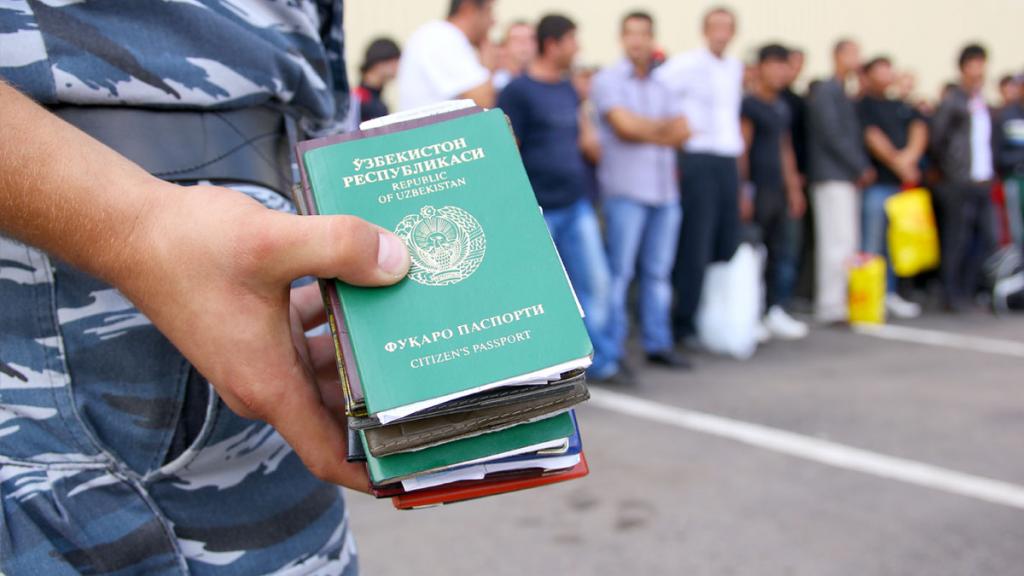In Russian legislation there is the concept of “administrative expulsion”. This measure can only be applied to non-citizens of the Russian Federation. Very often this term is confused with deportation. However, they have different reasons and consequences.
The problem of illegal immigration
It is no secret that many foreigners, especially from neighboring countries, come to work in the Russian Federation. In order not to be expelled from the country, it is necessary to comply with legal norms.
However, staying and crossing the border is far from always legal. Immigrants do not undergo a medical examination, live in unacceptable conditions, receive a low black salary and run the risk of being deceived by employers. They are not protected by Russian law, so they can be sent home at any time.
What it is
Administrative expulsion from the Russian Federation is the expulsion from the country of foreign citizens or stateless persons. It does not threaten the Russians. This punishment measure is used to ensure and maintain national security, public order, protect the health and life of Russians, as well as respect their rights and freedoms. It is mainly aimed at combating illegal immigration to Russia. Moreover, the decision on expulsion is taken solely by the court in respect of one person or group of persons.

What is the difference between administrative expulsion and deportation
These are two completely different concepts. Deportation is a compulsory measure of punishment of foreign citizens, which is initiated by the migration authorities of the Russian Federation. The grounds for it may be the following actions:
- The term of maximum stay in the Russian Federation was reduced, but the foreign citizen did not leave the country within 3 days.
- According to the decision of the migration service, a residence permit or a temporary residence permit were canceled, and the person did not leave Russia within 15 days.
- The authorities of the Russian Federation decided on the undesirability of a foreigner's stay or imposing a ban on entry.
- Lack of legal grounds for stay.
Deportation is never voluntary. Moreover, after expulsion, a foreign citizen has the right to visit Russia again if he has documents in order. Prohibitions on entry into the Russian Federation and fines are not provided.

The legislative framework
The basis for expulsion is a violation of the Code of Administrative Offenses, that is, the commission of the following actions:
- Violation of the migration regime of Russia (non-registration of temporary registration, visa, RVP and delay in these documents), as well as non-compliance with the rules for passing border control.
- Exceeding the permissible stay.
- Illegal labor immigration (activities without a work permit).
- Drug use and trafficking.
- The conclusion of a fictitious marriage (the migration service must prove this).
- Failure to comply with the rules of readmission agreements (homecoming).
- Providing employees of the migration service with knowingly false information.
- Evasion of administrative punishments in the Russian Federation or their commission more than 1 time during the year.
- Public order disturbance.
- Creating a threat to the life and health of Russian citizens.
Information on this measure of punishment is contained in Articles 3.2 and 3.10. The Code also defines a circle of persons to whom it cannot be applied. It includes:
- Persons with children, parents, spouses are Russian citizens or have the right to permanent residence in the Russian Federation.
- Political refugees.
- Foreigners who support their family in Russia are the only breadwinners.
- Employees of diplomatic missions of foreign states.
- Persons in whose homeland there is a war.
It is important to note that expulsion does not apply to military personnel who have contracted with the RF Armed Forces. While the issue of legalizing their status is being resolved, they are being held in specially designated premises.

Types of Administrative Expulsion
To start the procedure, police officers draw up a protocol, then paperwork begins and evidence is collected, then the offender awaits trial. The procedure can be carried out in two ways:
- The expelled independently leaves the territory of Russia.
- A foreigner crosses the border under the supervision of employees of the migration service.
The use of a particular expulsion method depends on the severity of the violation. These two types of procedures have their own characteristics.
Forced procedure
Administrative expulsion from the Russian Federation in this case is carried out by federal executive bodies. Moreover, the violator of the law, while waiting for departure from Russia, may be held in a special institution, center or premises designated for such purposes. This measure can also be applied in the case when the person does not have the funds to travel independently.
Officers of the bailiff service buy a ticket for a foreigner, go through a border control point with him. After that, they must transfer the passenger to the migration service of another state.
Self check out
This form of administrative expulsion from the Russian Federation is also called controlled. In this situation, a foreigner must leave Russia on his own within 5 days from the moment the court decides. When passing through border control, a passport is marked with a voluntary exit. If you do not leave yourself, the foreigner will be forced to be expelled.
The costs of acquiring tickets and traveling are mainly paid by the violator himself. Despite the fact that the procedure is carried out by a foreigner independently, its executive authority controls it. Its employees are required to transmit information to the Border and Migration Services.
If a minor is deported
The administrative expulsion of children is carried out in accordance with the Convention on the Rights of the Child. It is carried out exclusively in the presence of the legal representatives of the minor (parents, adoptive parents, trustees, guardians). Children should not be separated from them.
Moreover, the court may, at its discretion, take into account the presence of a child's family in Russia. However, the minor is expelled from the country together with his representative if the latter is deported or expelled.

The financial side of the issue
The court can impose obligations on reimbursement of expenses on the offender himself, the persons who invited him to Russia, the Embassy of his state or a public organization. In addition, it is possible to repay expenses from the state budget of the Russian Federation. Expenses for expulsion are the purchase of tickets, the organization of escort to the airport, and control of departure.
How can I challenge a ruling
If the decision on the administrative expulsion of stateless persons or foreigners was made illegally, it can be challenged. It is necessary to correctly draw up an appeal statement and attach supporting documents to it. During the proceedings, a foreigner can legally stay in Russia.
Documents can be submitted only within 10 days after the decision. If a foreign citizen, for a valid and independent reason, was unable to file an appeal on time, he can do so later if he provides documentary evidence.
You should contact the higher courts. However, if there is a good evidence base, the procedure can be carried out in standard court order. If the appeal is not upheld, a cassation appeal is possible.

Penalties
Administrative expulsion as such does not imply the payment of a fine, but can be replaced by it in the case when the violation is committed for the first time. The court at its discretion may oblige a foreign citizen to pay a fine in the amount of 2 to 20 thousand rubles. Such a punishment can be followed only with the following violations of the law:
- Illegal work and the provision of housing by an employer to an immigrant.
- Fictitious marriage.
Moreover, the fine may act as an additional penalty for expulsion upon self-departure. Article 32.2 of the Code of Administrative Offenses stipulates that it is necessary to pay a fine within 24 hours after a court makes a decision.
If a foreigner has not paid the debt to the state within the prescribed period, it increases by 3-5 thousand rubles. When the offender did not leave the Russian Federation on his own within 5 days, in addition to the additional fine, a compulsory procedure is also applied to him.

About the ban on entry
When administrative expulsion from the Russian Federation is always imposed a ban on visiting the state. Its period is determined by the court in each case. As a rule, if such a measure of punishment is applied to a foreigner for the first time, the term of the ban is 3 years or 5 years. If a person has repeatedly violated the law, the period is extended to 10 years.
If the ban has expired, a foreigner can enter Russia, but he will be denied residence permit, residence permit and citizenship. If you change your last name and first name or try to cross the border in any other way, it threatens deportation and criminal prosecution. The migration service identifies such violators.
If an entry ban has been imposed
Such a court decision may be challenged. Moreover, even after there was an administrative expulsion of a foreign citizen from the Russian Federation. This can only be done if the court applied this punishment erroneously, including because the violator provided false data. An appeal is also possible when there were violations during the proceedings and the lawyer can document this.
A mitigating circumstance during the consideration of a case will be a voluntary departure. It will be regarded as respect for the legislative norms of the Russian Federation.
A foreigner or stateless person should contact the Ministry of Internal Affairs Directorate for Migration. There he provides documents confirming the fact that there were no violations of Russian law on his part. Contact should be made no later than 3 months from the date of departure from Russia.

Administrative expulsion of foreign citizens is one of the penalties for violating Russian law. It is carried out exclusively through the court. In addition to violators, fines and a ban on entry into the country are applied. However, a court decision, with sufficient evidence, can be challenged. For this you need to provide strong evidence.









